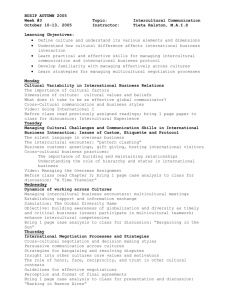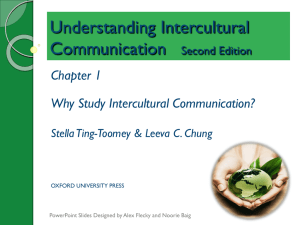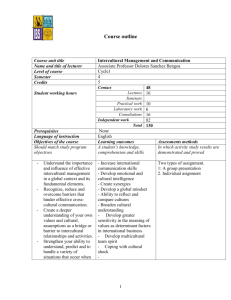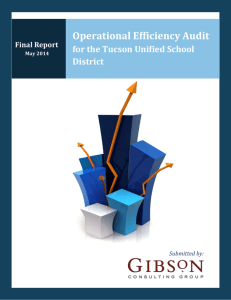TUCSON UNIFIED SCHOOL DISTRICT
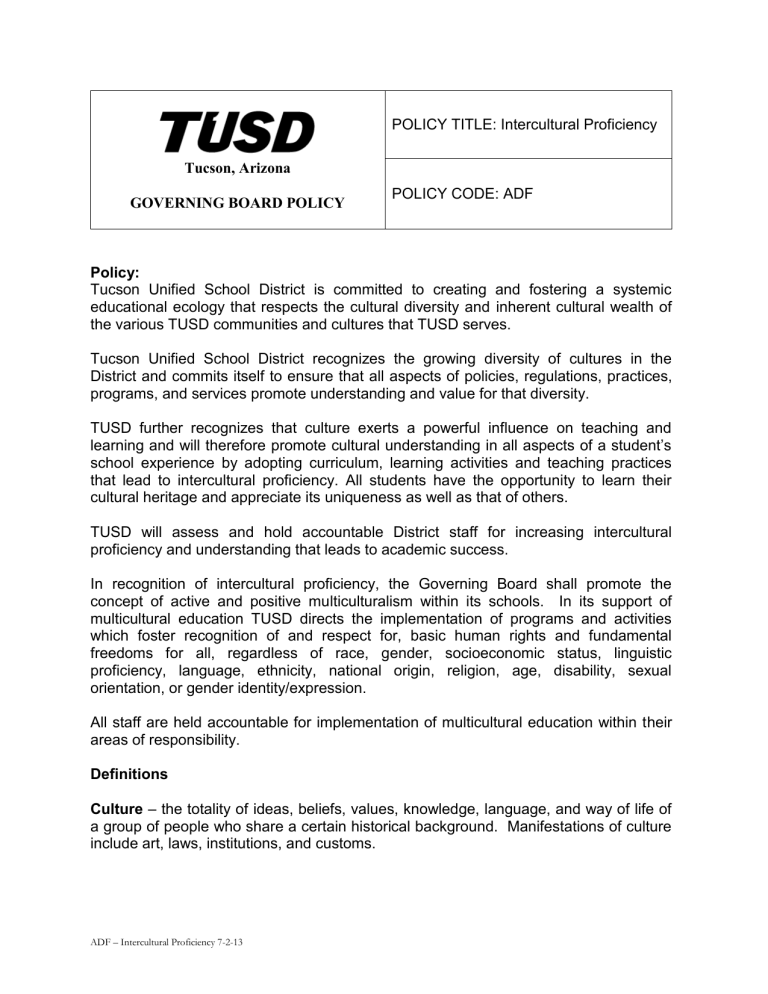
POLICY TITLE: Intercultural Proficiency
Tucson, Arizona
GOVERNING BOARD POLICY
POLICY CODE: ADF
Policy:
Tucson Unified School District is committed to creating and fostering a systemic educational ecology that respects the cultural diversity and inherent cultural wealth of the various TUSD communities and cultures that TUSD serves.
Tucson Unified School District recognizes the growing diversity of cultures in the
District and commits itself to ensure that all aspects of policies, regulations, practices, programs, and services promote understanding and value for that diversity.
TUSD further recognizes that culture exerts a powerful influence on teaching and learning and will therefore promote cultural understanding in all aspects of a student’s school experience by adopting curriculum, learning activities and teaching practices that lead to intercultural proficiency. All students have the opportunity to learn their cultural heritage and appreciate its uniqueness as well as that of others.
TUSD will assess and hold accountable District staff for increasing intercultural proficiency and understanding that leads to academic success.
In recognition of intercultural proficiency, the Governing Board shall promote the concept of active and positive multiculturalism within its schools. In its support of multicultural education TUSD directs the implementation of programs and activities which foster recognition of and respect for, basic human rights and fundamental freedoms for all, regardless of race, gender, socioeconomic status, linguistic proficiency, language, ethnicity, national origin, religion, age, disability, sexual orientation, or gender identity/expression.
All staff are held accountable for implementation of multicultural education within their areas of responsibility.
Definitions
Culture
– the totality of ideas, beliefs, values, knowledge, language, and way of life of a group of people who share a certain historical background. Manifestations of culture include art, laws, institutions, and customs.
ADF – Intercultural Proficiency 7-2-13
Diversity
– the unique characteristics that all persons possess that distinguish them as individuals and that identify them as belonging to a group or groups. Diversity and diverse populations may include but not be limited to:
Race and ethnicity
Gender
Gender identity/expression
Sexual orientation
Ability/disability status
Religion and spirituality
Age
Education
Socio-economic status
Language/communication modality
Individual experiential background
Lifestyle (interests, hobbies, activities, affiliations)
Family dynamics
Multiculturalism – is the recognition of the cultural differences that exist in a diverse society and the endorsement of a society in which individuals of all cultures are accorded acceptance and respect. Multiculturalism encourages a positive acceptance of ethnic, religious, cultural and other forms of diversity and views.
Multicultural Education
– is an approach to education, including administrative policies and regulations, procedures, curriculum and learning activities, that recognizes the experiences and contributions of diverse cultural groups.
Multicultural Competency
– is a process of learning that leads to an ability to effectively respond to the challenges and opportunities posed by the presence of social and cultural diversity. It is the knowledge, skills and personal attributes needed to live and work in a diverse world.
Intercultural Proficiency – Is the habitual and judicious use of communication, knowledge, technical skills, reasoning, emotions, values, and reflection in daily practice for the benefit of each individual and community in a diverse world
Adopted: July 12, 2005
Corrected: November 8, 2006 [Lead Department Title]
Revised: January 17, 2013 [Cross Reference Correction Only]
Revised: July 2, 2013 [Removal of Lead Dept Only]
LEGAL REF.:
CROSS REF.: AC
– Non-Discrimination
ACA
– Sexual Harassment
JB – Equal Educational Opportunities and Anti-Harassment
ADF – Intercultural Proficiency 7-2-13

